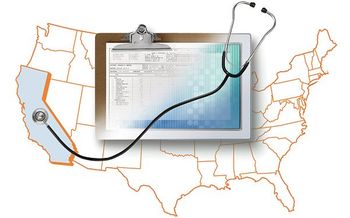
In today's competitive EMR "Market," there is always room for negotiation. Make sure that you negotiate a contract with your vendor that meets the specific needs of your practice.

In today's competitive EMR "Market," there is always room for negotiation. Make sure that you negotiate a contract with your vendor that meets the specific needs of your practice.

According to a survey by Bankrate.com, ATM fees cost an average of $2.22 in 2009, up 12.6% over last year. The average ATM surcharge has more than doubled since 1998.

Letting your spouse handle all financial matters and leaving yourself in the dark is a dangerous gamble. If a crisis arises, you'll be terribly handicapped by your inability to grasp your financial situation.

Growth will be driven by the continued dominance of opioids that include immediate-release morphine and novel fast acting opioid reformulations.

The emotion of real estate values can cloud clear thinking, which should tell you that there is almost never a time that waiting to sell a primary residence makes financial sense.

Congress is debating a bill that would extend COBRA subsidies to June 30 and apply it to workers laid off between January 1 and June 30 of next year and allow workers to keep coverage for two years.

Small steps like taking a coding class, establishing a tax-deferred savings account, and reviewing the performance of your financial advisors can net you a multitude of thousands with no real work involved.

First-time home buyer hurrying to close a real estate deal to get in on the home-buyer credit? Ease up on the ol' accelerator - the Senate recently passed a seven-month extension of the credit.

Generally, if you split your investment dollars between two investments, you would expect to get a return right in the middle. However, this is not the case if you rebalance your portfolio each year.

Recent research at the Institute of Cognitive Neuroscience, University College London, suggests that our genetic makeup predisposes us to one decision over another under uncertainly, a finding which could lead investors to better self-management.

According to a recent survey, car-rental fees not only haven't gone down because of the stumbling economy, but they've actually gone up by almost 50% since the credit crisis hit last October.

A medical practice that has proven to be a good credit tenant has leverage in lease negotiations; landlords are willing to negotiate when they know they have a reliable tenant.

The financial system is recovering, say the economists, but Washington lawmakers look at consumer sentiment and job losses and see tough times ahead, leading to questions about whether there will be another round of stimulus spending.

Estate planners are wrestling with the complexities involved with a possible estate tax repeal. Calculating the tax basis if it is repealed will be much more difficult, compounded by a short time frame.

Every decision we make is, at some level, based on an informed risk-reward ratio using the best information available for our patients. Yet, why when we see the word "risk" used in financial circles are we at a loss.? Why do we not understand what risk means in a financial context?

Yesterday's rebound by the US dollar and some technical resistance caused stocks to make an early pullback from 2009 highs and spend the rest of the session trading in lackluster fashion.

In 2010, upper-income taxpayers will, for the first time, be able to convert their traditional IRAs to a Roth IRA and reap the Roth’s tax advantages. Financial advisors caution, however, that you should convert only if you can afford to pay any taxes incurred from current income.

If you're just waiting for someone to buy you out at retirement, you will get virtually nothing for your practice. A real buyout plan requires 10, 20, or even 30 years worth of group contributions.

Tax exemption is the foremost reason municipal bonds remain attractive to investors, which will become more rewarding if, as expected, the Obama administration raises taxes.

Economists are not in agreement, but the best guess is that the current budget deficit is likely to produce some inflation. Now is the time to talk to your financial advisor about how well you are positioned for such a scenario.

The House of Representatives voted 220-215 on Saturday, November 7, to pass healthcare reform bill 3962.

If your patient records aren't already stored digitally, they are likely to be digitized soon. There is a tremendous push by the federal government-as well as by some private payors and self-insured employers-to get all healthcare providers wired in the near future, in order to better coordinate patient care, improve outcomes, and "bend the cost curve" all at the same time.

Where once airline miles expired if they weren’t used after two or three years, most US airlines will now wipe out an entire miles account if it doesn’t show any activity within a certain time period. The grace period varies by airline, with some cancelling accounts after just 12 months of inactivity.

ING Direct has been ordered by its homeland Dutch government to cut loose its US operations as a prerequisite to getting government aid. The potential divestiture leaves millions of ING customers with questions about the fate of their deposits and mortgages.

The market staged an impressive rebound last week and is looking to build on that move in early trade following G-20 commentary, overseas strength and Dollar Index declines leaving it back near its 52-wk low from Oct.

Determining when to invest in commodities can be challenging, but profitable. In a downturn, such as we have now, real assets may not do as well as stocks. In an inflationary upturn however, they can outpace other options. Unfortunately, no one has a crystal ball to determine the best time for an investor to plunge into this asset class.

Donating stock and cash to your favorite charities can get you tangled up in a tax mess, so if you're in a giving mood, look to a donor-advised fund which can be set up to pay out years after your death.

Some consumer advisors suggest that you get the best results for your efforts by making major lifestyle changes while others say small moves like clipping coupons can create frugal habits that translate into big savings.

The easiest way to sniff out an investment scam is to check with real regulators. The North American Securities Administrators Association and the SEC should be the first people you call.

With the fall season well underway and the end of the year fast approaching, it is a good time for investors to take a comprehensive review of their wealth and examine strategies to maximize it in 2010.